Any easy question for the Mathematica experts here:
Given a list, say
Clear[a, b, c];
data = {a, b, c};
and I want to get back all lists of length 1,2,3,...Length[data] starting from the start to the end, so that I get the following for the above
out = {{a}, {a, b}, {a, b, c}}
I looked at the commands in M to find a ready one to use, and I could (looked at all the Map's and Nest* functions, but not that I can see how to use for this). I am sure it is there, but I am not seeing it now.
now I do this silly Do loop to build it
m=Length[data];
First@Reap[Do[Sow[data[[1;;i]]],{i,1,m}]][[2]]
{{a},{a,b},{a,b,c}}
question is: does Mathematica have a build-in command to do the above?
update 8 am
I've deleted the tests I've done an hr ago and will be reposting them again soon. I need to run them few times and take an average as that is the better way to do this performance test.
update 9 am
Ok, I've re-run the performance tests on all solutions shown below. 8 methods.
For each method, I run it 5 times and took the mean.
I did this for n={1000, 5000, 10000, 15000, 25000, 30000} where n is the length of the original list to process.
can't go much over 30,000, will run out of ram. I only have 4 GB ram.
I made a small function called makeTable[n, methods] which generate performance table for specific n. test code is below (written quickly so not the most clean code, not very functional, as I have to go :), but it is below and any one can change/clean it, etc... if they want
conclusion: Kguler method was the fastest, with Thies method almost the same for large n, (30,000), so for all practical purposes, may be Thies and Kguler methods can be declared as the winners for large n? But since Kguler is also fastest for small n, so far, he gets the clear edge.
Again, test code is below for any one to check and run to see if I might made an error somewhere. As correctly predicted by Leonid, the linked list method did not fare too well for large n.
I think more tests are needed, as only taking the mean of 5 might not be enough, also other considerations I might have missed. This is not an exact test, just a rough one to get an idea.
I tried not to use the pc much while running the tests. I used AbsoluteTiming[] to measure cpu.
Here is screen shot of the tables generated

Here is the test code:
methods = {nasser, wizard1, wizard2, wizard3, kguler, leonid1,
leonid2, thies};
AppendTo[$ContextPath, "Internal`"];
ClearAll[linkedList, leonid2];
SetAttributes[linkedList, HoldAllComplete];
nasser[lst_] := Module[{m = Length[lst]},
First@Reap[Do[Sow[lst[[1 ;; i]]], {i, 1, m}]][[2]]
];
wizard1[lst_] := Module[{},
Take[lst, #] & /@ Range@Length@lst
];
wizard2[lst_] := Module[{},
Table[Take[#, i], {i, Length@#}] & @lst
];
wizard3[lst_] := Module[{},
Rest@FoldList[Append, {}, #] & @lst
];
kguler[lst_] := Module[{},
Reverse@NestList[Most, #, Length[#] - 1] & @lst
];
leonid1[lst_] := Module[{b = Bag[{}]},
Map[(StuffBag[b, #]; BagPart[b, All]) &, lst]
];
leonid2[lst_] := Module[{},
Map[List @@ Flatten[#, Infinity, linkedList] &,
FoldList[linkedList, linkedList[First@lst], Rest@lst]]
];
thies[lst_] :=
Module[{},
Drop[Reverse@
FixedPointList[If[Length[#] > 0, Most, Identity][#] &, lst], 2]
];
makeTable[n_, methods_] :=
Module[{nTests = Length[methods], nTries = 5, i, j, tests, lst},
lst = Table[RandomReal[], {n}];
tests = Table[0, {nTests}, {nTries}];
For[i = 1, i <= nTests, i++,
For[j = 1, j <= nTries, j++,
tests[[i, j]] = First@AbsoluteTiming[methods[[i]][lst] ]
]
];
tbl = Table[{ToString[methods[[i]]], Mean[ tests[[i, All]] ]}, {i,
nTests}] ;
Grid[Join[{{"method", "cpu"}}, tbl],
Frame -> All, FrameStyle -> Directive[Thickness[.005], Gray],
Spacings -> {0.5, 1}
]
];
Now to run, do
makeTable[1000, methods]
Warning, do not try something over 30,000 unless you have zillion GB, else M might not return. It happened to me, and had to reboot the PC.
update 12/26/11 3:30PM
I see that Thies has a newer version of this algorithm (I called it thies2 in the methods table), so I re-run everything again, here is the updated table, I removed the linked list version since it is known in advance not to be fast for large n, and this time, I run them each for 10 times (not 5 as above) and then took the mean). I also started M fresh using factory setting (restarted it holding alt-shift keys so that all setting are back to original settings just in case)
conclusion so far
Kugler is fastest for smaller n, i.e. n<20,000. For larger n, now Thies second version is faster than Thies version 1 and now it edges ahead ever so slightly ahead of Kugler method for large n. Congratulation to Thies, the current lead in this performance test. But for all practical purposes, I would say both Thies and Kugler methods are the fastest for large n, and Kugler remain the fastest for smaller n.
Below are tables and the updated test code below them. Any one is free to run the tests for themselves, just in case I might overlooked something.

The current test code:
$MinPrecision = $MachinePrecision;
$MaxPrecision = $MachinePrecision;
methods = {nasser, wizard1, wizard2, wizard3, kguler, leonid, thies1,
thies2};
AppendTo[$ContextPath, "Internal`"];
nasser[lst_] := Module[{m = Length[lst]},
First@Reap[Do[Sow[lst[[1 ;; i]]], {i, 1, m}]][[2]]
];
wizard1[lst_] := Module[{},
Take[lst, #] & /@ Range@Length@lst
];
wizard2[lst_] := Module[{},
Table[Take[#, i], {i, Length@#}] & @lst
];
wizard3[lst_] := Module[{},
Rest@FoldList[Append, {}, #] & @lst
];
kguler[lst_] := Module[{},
Reverse@NestList[Most, #, Length[#] - 1] & @lst
];
leonid[lst_] := Module[{b = Bag[{}]},
Map[(StuffBag[b, #]; BagPart[b, All]) &, lst]
];
thies1[lst_] :=
Module[{},
Drop[Reverse@
FixedPointList[If[Length[#] > 0, Most, Identity][#] &, lst], 2]
];
thies2[lst_] :=
Module[{},
Drop[Reverse@
FixedPointList[If[# =!= {}, Most, Identity][#] &, lst], 2]
];
makeTable[n_Integer, methods_List] :=
Module[{nTests = Length[methods], nTries = 10, i, j, tests, lst},
lst = Table[RandomReal[], {n}];
tests = Table[0, {nTests}, {nTries}];
For[i = 1, i <= nTests, i++,
For[j = 1, j <= nTries, j++,
tests[[i, j]] = First@AbsoluteTiming[methods[[i]][lst] ]
]
];
tbl = Table[{ToString[methods[[i]]], Mean[ tests[[i, All]] ]}, {i,
nTests}] ;
Grid[Join[{{"method", "cpu"}}, tbl],
Frame -> All, FrameStyle -> Directive[Thickness[.005], Gray],
Spacings -> {0.5, 1}
]
];
To run type
n=1000
makeTable[n, methods]
Thanks for everyone for their answers, I learned from all of them.